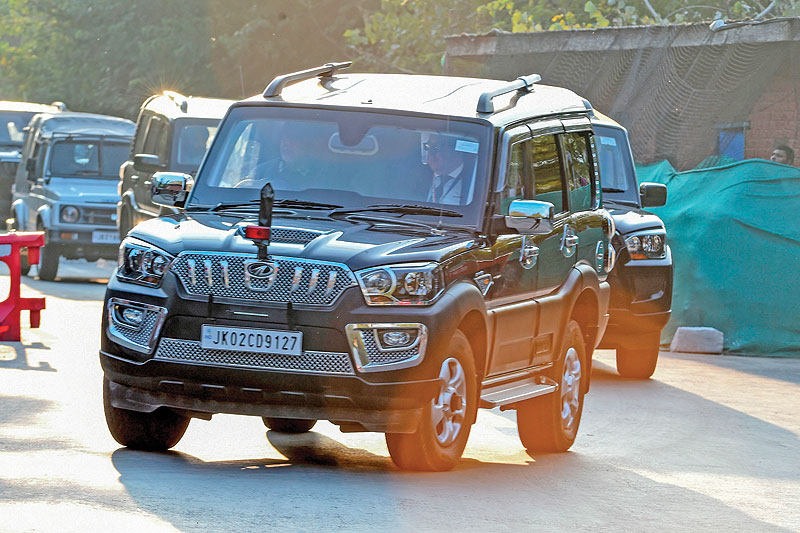India complains to aviation body after Pakistan's rebuff to Modi
SRINAGAR: European Union lawmakers arrived in Srinagar yesterday, the first foreign delegation to visit Indian Kashmir's main city since New Delhi revoked the region's autonomy in August. Hours before their arrival, small protests erupted in at least 40 locations around the city, prompting security forces to fire tear gas, a police official and Reuters witnesses said, despite heavy troop deployment.
Many streets remained strewn with stones, shops were closed and roadside vendors absent as the delegation of around 20 EU lawmakers arrived in the city shortly after noon. Indian officials say the situation in Kashmir is returning to normal and hope that the EU delegation's visit will help counter international condemnation of the government's handling of the situation.
But opposition parties are angry that European lawmakers are being allowed to visit a region from which most Indian politicians have been barred since Aug. 5, when Prime Minister Narendra Modi's government revoked Kashmir's special status and imposed a harsh crackdown to stifle dissent.
"MPs (members of parliament) from Europe are welcome to go on a guided tour of Jammu and Kashmir while Indian MPs are banned and denied entry," Congress leader Rahul Gandhi said in a tweet. "There is something very wrong with that." Indian security officials turned back several opposition politicians from Srinagar airport over the last several weeks saying the situation was not stable enough for such visits.

The EU delegation - some of them from far-right parties - was driven in a cavalcade of black SUVs, accompanied by armed troops and security jeeps, to a military cantonment in Srinagar. This was to be followed by meetings with civil society members, businessmen, two government officials said. On Monday Modi received the delegation and said their visit would give them a clear view of the development priorities of the region, the prime minister's office said.
Pakistan airspace
Meanwhile, the United Nations' aviation agency has asked Pakistan for more information about an overflight request from India, it said yesterday, after Islamabad denied permission to Prime Minister Narendra Modi to cross its airspace on an overseas tour. Tension has flared between the neighbors over the disputed Kashmir after India stripped the Himalayan region of its autonomy and severed telecoms links for months, with flights over Pakistan becoming the latest sticking-point in relations.
Modi, who flew to Saudi Arabia on Monday for an investors' summit, took a circuitous route because of Pakistan's refusal, an Indian foreign ministry source said. India had taken up the issue with the International Civil Aviation Organization (ICAO), the official added. "It is a standard thing we do, we seek permission from the countries on the route," said the official, who sought anonymity because of the sensitive diplomatic situation. "It was done in this case too, and it was refused."
Pakistan's foreign minister, Shah Mehmood Qureshi, said Modi was being blocked because of his government's repression in the Muslim-majority territory of Kashmir. "In the context of the gross Indian atrocities in occupied Kashmir, we have decided not to allow him use our airspace," he said in a ministry statement on Sunday. India withdrew Kashmir's special status in August in order to tighten its grip over the region and clamped down on public gatherings, telecommunications and detained scores of leaders, provoking condemnation from Pakistan.
Islamabad previously refused a request in September from Modi to cross its airspace on a flight to Germany as tension runs high over Kashmir. In Montreal, ICAO spokesman Anthony Philbin said India had sent the agency a letter about Pakistan's refusal to grant overflight clearance. It is not clear, however, what action the agency could take to resolve the dispute between Islamabad and New Delhi over such clearance.
The 1944 Convention on International Civil Aviation, which established ICAO and promotes cooperation between countries, only applies to the operations of civilian aircraft, and not to state or military aircraft. Philbin said he believed flights carrying national leaders were considered state aircraft, and so not subject to ICAO provisions. A similar ratcheting-up of tension led to an aerial clash between the arch foes in the skies over Kashmir this year, prompting Pakistan to shut its airspace for months to all aircraft travelling to and from India, forcing airlines to take longer routes. - Agencies




